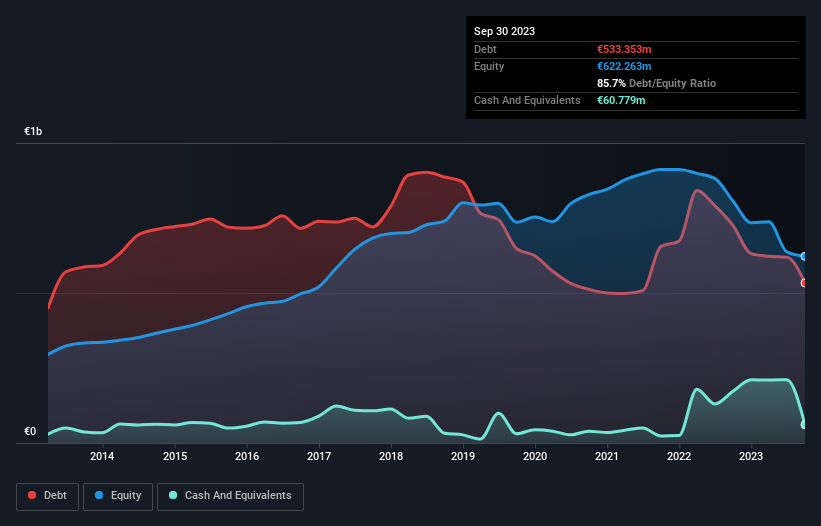Warren Buffett famously said, 'Volatility is far from synonymous with risk.' When we think about how risky a company is, we always like to look at its use of debt, since debt overload can lead to ruin. Importantly, Brack Capital Properties N.V (TLV:BCNV-M) does carry debt. But should shareholders be worried about its use of debt?
What Risk Does Debt Bring?
Debt and other liabilities become risky for a business when it cannot easily fulfill those obligations, either with free cash flow or by raising capital at an attractive price. In the worst case scenario, a company can go bankrupt if it cannot pay its creditors. However, a more usual (but still expensive) situation is where a company must dilute shareholders at a cheap share price simply to get debt under control. Of course, plenty of companies use debt to fund growth, without any negative consequences. When we examine debt levels, we first consider both cash and debt levels, together.
Check out our latest analysis for Brack Capital Properties
What Is Brack Capital Properties's Net Debt?
As you can see below, Brack Capital Properties had €533.4m of debt at September 2023, down from €725.5m a year prior. However, it also had €60.8m in cash, and so its net debt is €472.6m.

A Look At Brack Capital Properties' Liabilities
We can see from the most recent balance sheet that Brack Capital Properties had liabilities of €77.8m falling due within a year, and liabilities of €599.9m due beyond that. Offsetting these obligations, it had cash of €60.8m as well as receivables valued at €2.69m due within 12 months. So its liabilities total €614.2m more than the combination of its cash and short-term receivables.
Given this deficit is actually higher than the company's market capitalization of €425.7m, we think shareholders really should watch Brack Capital Properties's debt levels, like a parent watching their child ride a bike for the first time. Hypothetically, extremely heavy dilution would be required if the company were forced to pay down its liabilities by raising capital at the current share price. There's no doubt that we learn most about debt from the balance sheet. But it is Brack Capital Properties's earnings that will influence how the balance sheet holds up in the future. So if you're keen to discover more about its earnings, it might be worth checking out this graph of its long term earnings trend.
Over 12 months, Brack Capital Properties made a loss at the EBIT level, and saw its revenue drop to €77m, which is a fall of 7.6%. That's not what we would hope to see.
Caveat Emptor
Importantly, Brack Capital Properties had an earnings before interest and tax (EBIT) loss over the last year. To be specific the EBIT loss came in at €8.5m. Considering that alongside the liabilities mentioned above make us nervous about the company. We'd want to see some strong near-term improvements before getting too interested in the stock. For example, we would not want to see a repeat of last year's loss of €170m. And until that time we think this is a risky stock. There's no doubt that we learn most about debt from the balance sheet. However, not all investment risk resides within the balance sheet - far from it. Case in point: We've spotted 3 warning signs for Brack Capital Properties you should be aware of.
If you're interested in investing in businesses that can grow profits without the burden of debt, then check out this free list of growing businesses that have net cash on the balance sheet.
Valuation is complex, but we're here to simplify it.
Discover if Brack Capital Properties might be undervalued or overvalued with our detailed analysis, featuring fair value estimates, potential risks, dividends, insider trades, and its financial condition.
Access Free AnalysisHave feedback on this article? Concerned about the content? Get in touch with us directly. Alternatively, email editorial-team (at) simplywallst.com.
This article by Simply Wall St is general in nature. We provide commentary based on historical data and analyst forecasts only using an unbiased methodology and our articles are not intended to be financial advice. It does not constitute a recommendation to buy or sell any stock, and does not take account of your objectives, or your financial situation. We aim to bring you long-term focused analysis driven by fundamental data. Note that our analysis may not factor in the latest price-sensitive company announcements or qualitative material. Simply Wall St has no position in any stocks mentioned.
About TASE:BCNV-M
Brack Capital Properties
A real estate company, owns and develops residential and commercial properties in Germany.
Low and slightly overvalued.
Market Insights
Community Narratives



